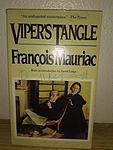François Mauriac
François Mauriac was a French novelist, dramatist, critic, poet, and journalist, born on October 11, 1885, in Bordeaux, France, and died on September 1, 1970, in Paris. He is best known for his series of novels depicting the spiritual and moral struggles of the human condition, often set against the backdrop of his native Bordeaux region. Mauriac was awarded the Nobel Prize in Literature in 1952. His work is characterized by its deep analysis of characters' inner lives and its exploration of themes such as sin, grace, and redemption.
Books
This list of books are ONLY the books that have been ranked on the lists that are aggregated on this site. This is not a comprehensive list of all books by this author.
-
1. Thérèse Desqueyroux
The novel revolves around the life of Thérèse Desqueyroux, a woman trapped in a loveless marriage in rural France. She is married to Bernard for the sake of property and wealth, not love. Feeling suffocated by the societal expectations and her husband's domination, Thérèse tries to poison Bernard. However, her plan fails and she is acquitted due to lack of evidence. The rest of the novel explores Thérèse's introspection, her struggle with guilt, and her quest for redemption and freedom.
-
2. Viper’s Tangle
"Viper's Tangle" is a psychological novel that tells the story of a wealthy lawyer who, in his old age, becomes increasingly bitter and misanthropic. The protagonist writes a series of letters to his wife, expressing his deep resentment towards his family who he believes are only interested in his fortune. As he grapples with his own mortality and the meaninglessness of his life, he experiences a spiritual awakening that leads him to reconsider his views on love, family, and faith.
-
3. The Knot Of Vipers
The novel explores the inner turmoil of an elderly lawyer who, on the brink of death, reflects on his life with bitterness and regret. He has amassed a considerable fortune, which he plans to use as a final weapon against his unloving family, whom he despises. As he writes a letter to his wife, intending to disinherit their children, he delves into his past, examining the roots of his emotional detachment and the loveless marriage that has defined his existence. The narrative delves into themes of greed, family dysfunction, and the quest for redemption, revealing the complexities of human relationships and the potential for transformation even in the twilight of one's life.
-
4. The Desert Of Love
The novel explores the complex emotional landscapes of a father and son, both infatuated with the same alluring woman, Maria Cross. Set against the backdrop of early 20th-century France, the narrative delves into the psychological turmoil and moral dilemmas faced by the two men as they vie for the affection of Maria, who remains an elusive and enigmatic figure in their lives. The story examines themes of obsession, unrequited love, and the generational divide, ultimately revealing the profound loneliness and desires that drive human behavior and the inevitable disappointments that come with idealizing another person.
-
5. The Woman Of The Pharisees
The novel is a penetrating character study set in early 20th-century France, told through the eyes of a young man reflecting on his past. It centers around a devoutly Catholic woman, whose outward piety and strict adherence to religious principles mask a deep-seated pride and a penchant for manipulation. As the narrator recounts his experiences with this woman, who is closely associated with his family, the narrative explores themes of hypocrisy, morality, and the complex interplay between religion and human nature. The woman's influence on those around her leads to various personal tragedies, revealing the dangers of self-righteousness and the often harsh judgment she imposes on others in the name of virtue.




